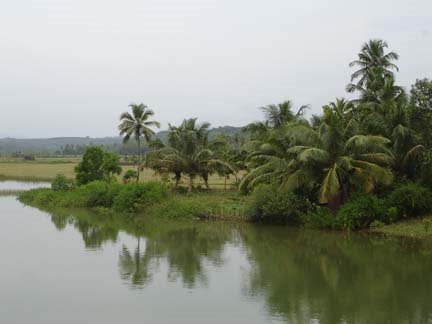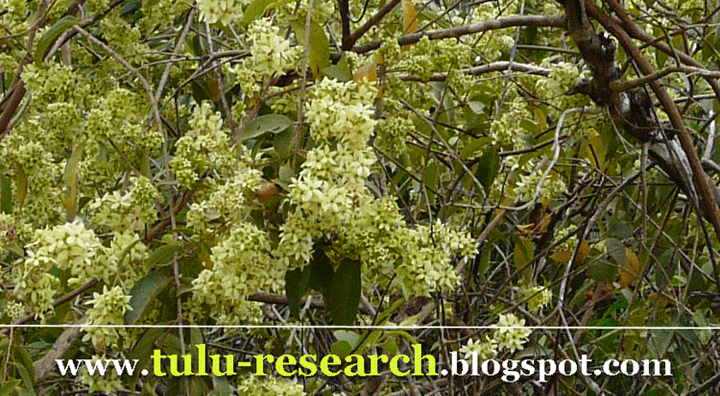The
rainbow is popularly known as, ‘Ajji biru’ (or Ajja biru) in Tulu language. Literally,
it means a ‘bow of grandma (or grandpa) or even bow of an old woman. This
archaic word is still extant in local tongue in rural areas. So it has rightly
and deservedly found an entry in the mighty Tulu Lexicon (page 51). However, the origin of this word is obscure. An
attempt is made here to find out the secret of this word in pursuance of our
inquisitiveness.
We
have been using this word during our upbringing in native villages. Besides the natural ‘ajjibiru’ seen during
rainy days, we used to create it while bathing near draw-well or pond. By
standing opposite to the Sun, we puff out and splash the water collected in the
mouth to create a magical imagery of rainbow for a few seconds.
Who has not seen a rainbow near waterfall or fountain on spraying water? A rainbow means a bow or arc of prismatic colours. It appears on eastern or western horizon when clouds are opposite to the Sun. Rainbow is created by the refraction of the Sun’s rays through the drops of rain water. Momentary appearance of this natural phenomenon is encased in a Tulu Proverb: “
Who has not seen a rainbow near waterfall or fountain on spraying water? A rainbow means a bow or arc of prismatic colours. It appears on eastern or western horizon when clouds are opposite to the Sun. Rainbow is created by the refraction of the Sun’s rays through the drops of rain water. Momentary appearance of this natural phenomenon is encased in a Tulu Proverb: “
ಅಜ್ಜಿಬಿರು ಅಜ್ಜೆ
ಬನ್ನಾಟ ಕಾಪಂದು” (Ajjibiru ajje bannaata kapandu).
=A rainbow does not wait till
grandfather comes.
Origin
Let
us explore the origin of word ‘Ajjibiru’, which is also pronounced as
‘Ajjibeer’ erroneously by some:
1.
The
most probable explanation is that the rainbow bending is compared to bending of
an old woman (or old man)
2.
‘Aje’
in Tulu means ‘a row’ or ‘raised line’ (as is used for clothesline). So it
could be explained as ‘a row or range of bows’.
3.
Next
explanation could be ‘bow created by ‘Aaji neeru’ (i.e. evaporated water).
4.
There
is one more reason for originating this name.
Whenever a rainbow is seen on the horizon, it is elders, say grandma or
grandpa, who point out first the rainbow to their young ones.
5.
Another
explanation is ‘Aaji biru’, meaning ‘six (coloured) bows’. But this is a highly improbable proposition,
as rainbow has seven colours and not six. Could it be a mistake in counting
when this word is coined by our forefathers?
6.
The
phrase ‘Ajji biru’ might have originated as an idiomatic phrase to represent the colorful bow
(‘biru’ in Tulu) shaped rainbow shown to children as a momentary object of
curiosity and intensive interest by grandmothers.
Aja biru
7. Another probable argument
that 'Ajabiru' (= Brahma dhanu) has been corrupted to 'Ajjibiru' in the
course of time by illiterate rustics. Brahma, (= Aja), has
the meaning of 'Big or Great'. So, Aja biru means 'a great bow'. This reminds us
the story of 'Tripura
Samhara'. After the death of their father Tarakasura by Lord Kartikeya,
his three sons (Tarakaksha, Kamalaksha and Vidyunmali) after rigorous penance
get the boon of invincibility in three worlds from Lord Brahma. Brahma
gives boon with a condition that they would be killed together with one darting
of an arrow. He orders them to get three citadels (fortifications) made
through Demon architect Mayasura. These three cities are movable in sky
but they are not to align in a line, so that Shiva can destroy them (in Pushya
Nakshatra) with a single arrow, as per the condition. They know that being
devotees of Shiva, he would not kill them. They start troubling one and all in
three worlds as Lord Shiva is also helpless single-handedly. With three
energies of Brahma, Narayana and Shiva put together, Lord Shiva destroys the
three citadels altogether
Conclusion
Readers
may not agree to our logical listing of reasons.We invite them to come out with the correct reasoning in coining the Tulu word
‘Ajjibiru’, i.e. rainbow.
A
bright display or event is also compared to a ‘rainbow’. A visionary goal or ambition is alluded to
‘rainbow’. Example: “He went in pursuit of ‘rainbow’ of becoming so and so in
life.” It also means a range of things,
groups, etc. Rainbow is, therefore, a
symbol of brightness, a dream and a logical connection for peaceful
co-existence.




No comments:
Post a Comment